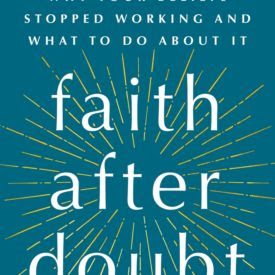The lessons from John we have read since Easter have shown us the confident and wise Jesus, certain of his purpose and profound in his teaching. He is calm, capable and in control. Through sustained discourses and long prayers that are unique to John, we have also glimpsed the mystery of Jesus’s intimate relationship with the Father and the continuation of Jesus’ ministry through the Advocate, the Holy Spirit. Speaking continually of love and praying relentlessly for unity, Jesus is carefully preparing his followers for faithful and fruitful discipleship after he has departed from them. In John, Jesus moves deliberatively and knowingly, right up to the moment of his death, which he decisively confirms by saying, “It is finished” (John 19:30). The divine nature of Jesus is on full display in the Gospel of John in all of its depth and complexity and wonder. Over these many weeks of reading from John, we have perhaps found a measure of reassurance. The journey to the cross is difficult, but at least Jesus knows what he is doing.
The shift from John’s cool and composed Jesus to the Jesus we see in this week’s lesson from Mark is jarring. Here we encounter Jesus as volatile and, at least to some, erratic. Here is Jesus in all of his humanity living into the fullness of his life’s purpose. The scene follows a fast-paced opening sequence in Mark where, in the space of just a couple of chapters, Jesus performs an impressive list of healings and exorcisms, generating astonishment and amazement from an ever-growing crowd. “We have never seen anything like this” (Mark 2:12) typifies the response to Jesus in this early part of Mark. The narrative is action-packed, and everyone seems to have a decided view of Jesus. He calls disciples who follow “immediately” (1:18), but he also draws the ire of the religious authorities who are already seeking to “destroy him” (3:6). The dividing lines are quickly drawn.
Accordingly, emotions are high and the situation is tense as this week’s passage begins. A multitude gathers again around the charismatic Jesus, while others have come to believe that he has gone too far. Is he too popular, too powerful, too “outside the box”? Have there been too many outsiders included, too many sinners welcomed, too many norms violated? There is something about this Jesus that attracts and repels. Great numbers crowd around him; but others, even his own family, conclude he needs to be restrained. “He has gone out of his mind” (3:21) is perhaps really a way of saying that he has gone beyond our minds. He has surpassed what we might expect or imagine. The boundlessness, the inclusiveness, the unwillingness to be limited by regulation or convention, the unrestrained mercy and grace — all of it is beyond what we can grasp. He doesn’t conform to polite society, and he seemingly has little interest in decency and order. What kind of Presbyterian is he?
Is he insane? Is he himself demon-possessed? Jesus deflects the swirling accusations with a couple of parables that retain their significance. His observation that a house divided against itself cannot stand not only gave Abraham Lincoln a moral foundation for the healing of the nation, it also serves as an indictment of the seemingly growing divisions in our common life. From the usefulness of masks to the necessity of vaccines, from the conduct of police to the definition of infrastructure, from the legitimacy of elections to the role of the press, dissension deepens in our life together. How much more division can we endure before the house falls and crushes everyone?
In the connected parable Jesus points to “the strong man” who must be dealt with, “tied up,” before anything else can definitively happen. The strong man is the root cause that must be addressed in order for meaningful progress and lasting change to happen. The strong man can be a structure or a stereotype, a prejudice or a falsehood, a memory or a regret. The strong man is that which holds us captive, continually exerting influence and accumulating power. Whatever form it may take, tying up the strong man requires persistent courage and committed truth-telling, following the example of Jesus himself.
As these provocative words and those that follow related to forgiveness settle, Jesus’ mother and brothers come. They stand outside calling to him. Convention and expectation indicate that Jesus should draw them inside, giving them a privileged place among those who have circled around him. They are family, after all. Instead, Jesus again pushes against and beyond accepted categories, suggesting that family intimacy is not defined by biological connection, but rather by spiritual companionship. The family of Jesus is comprised of those who join him in seeking to do God’s will. It is a new creation, a new humanity, a new way of being intimately related to one another.
This passage puts before us the radical Jesus, defying assumptions, living abundantly, loving recklessly, undeterred by opposition, willing to accept that his words and deeds will provoke and irritate, even as they surprise and convict. He is focused on bearing witness to the reign of God, a reality that threatens the powerful and shatters the familiar, while touching the untouchable and gathering those otherwise cast out. Those thought to be privileged are left standing outside, while those previously looked over and left out are drawn into the circle. This Jesus sees the limits of our arrangements, procedures and polity – and even our lectionary! Pursuing God’s will is what matters most to him. God’s intent is healing and forgiveness, mending the wounded, binding up the brokenhearted and lifting the lowly. These are the goals of Jesus’ life. Whatever the cost, however many the accusations, whatever the outrage, however many will be shocked or confused or disappointed, Jesus resolutely embraces what God has set before him. Then, in perhaps the most radical move of all, he invites us to join him in this holy work — which is to say he invites us to join his family.
Maybe he is out of his mind. Maybe our salvation requires nothing less.
This week:
- How do you feel about Mark’s presentation of Jesus in this passage? What appeals to you about Jesus’ humanity? What appeals to you about his divinity?
- What is it about Jesus that attracts great crowds but also generates fierce opposition?
- What are current examples of a house divided against itself that most concern you? What role do people of faith have in easing divisions?
- Can you point to specific examples of a “strong man” who must be tied up before something significant can be accomplished?
- How do you respond to Jesus’ words about what constitutes his family? Why is this teaching so challenging?
- What do you think is the most radical element of Jesus’ ministry?












No comments:
Post a Comment